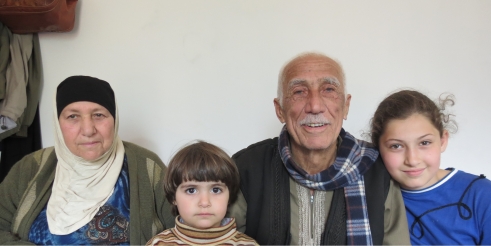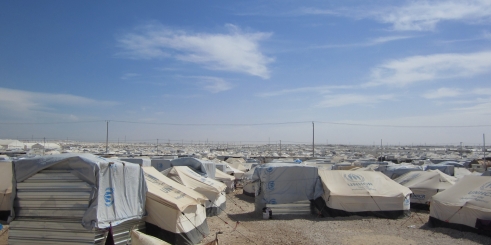
(c) Claire Catherinet/HelpAge International
Refugee family from Syria living in Lebanon
By Ben Small
As world leaders convene at the Syria Donors Conference 2016 this week to discuss financial solutions to the ongoing humanitarian crisis, we are calling for a commitment to long-term funding to support older people and other vulnerable individuals.
Millions isolated inside Syria
More than four million Syrians have escaped into neighbouring countries since the conflict began almost five years ago. However there are still some 13.5 million in urgent need of humanitarian assistance inside the country’s borders (PDF).
Among these hard-to-reach people, there are many vulnerable groups, including older people and those with disabilities, who do not have the option of fleeing or do not want to leave their homes.
“Funding is needed to support key areas, particularly the protection of vulnerable groups and weaknesses in the health management of chronic diseases, especially among older people,” said Toby Porter, Chief Executive at HelpAge International.
There are no clear figures about the number of older people inside Syria. However, in 2010, before the war began, the UN estimates they made up 5.2% of the population. Of the registered refugees who left the country since, 2.9% have been aged 60 or over. This would leave a disproportionate number of older people within the country’s borders.
Alone, hungry and at risk of violence
Those who stayed behind will have seen their support networks diminish as family members and other younger carers escape.
“Older people tend to be less able to flee the horrors of the conflict because of the demands and hardship involved in making long, arduous journeys in search of refuge, and they are often less willing to flee because they don’t want to abandon their homes,” said Frances Stevenson, Head of the Humanitarian Team at HelpAge International.
“Left behind and alone, they are less able to access essential supplies and services such as food, water and healthcare, or to defend themselves against violence and abuse.
“We also know that the health needs of older people in Syria are not being addressed. Drugs for chronic diseases affecting so many older people are just not available for many.”

(c) Amandine Allaire/HelpAge International
Jordan’s Zaatari camp for Syrian refugees
For those that have left behind the familiarity of home to cross the border into countries like Lebanon and Jordan, the situation is not much better. Older refugees report high levels of isolation and neglect in the camps. This affects their psychological wellbeing and has a detrimental impact on their day-to-day lives.
For NGOs to provide the assistance to these vulnerable, hard-to-reach groups, donors have a responsibility to commit the necessary funds and ensure no one is left behind both inside Syria and living in refugee camps in neighbouring countries.
Please make a donation to HelpAge International to help us provide vital support to the older people affected by the Syria crisis.
